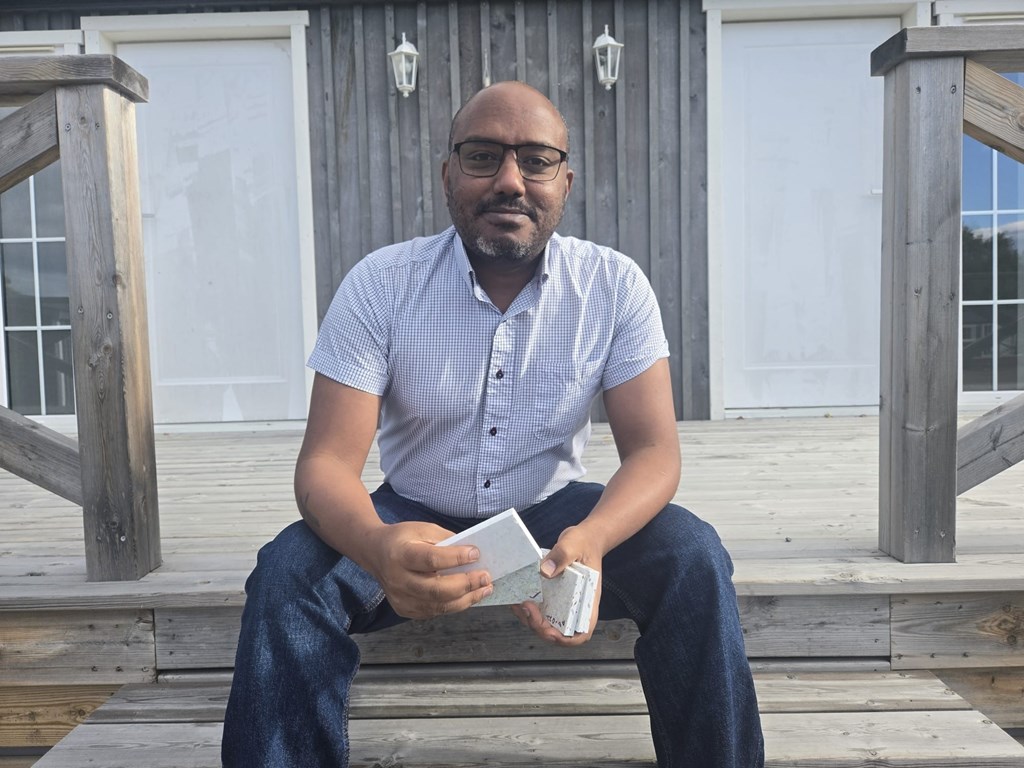
Plastic Waste Becomes Tomorrow’s Kitchen Designs
When Abel Kebede moved to Sweden to pursue a master's degree in marketing, launching a plastic recycling company in Skellefteå was the last thing he expected. But with a background in innovation and a passion for creating new solutions, he has found his place in the region's thriving innovation ecosystem – and his idea could soon give plastic waste a new life in people's homes.
"I have always loved developing things. My goal isn't just to solve a problem but to optimise it. If a machine produces ten units an hour, why can't it produce fifty? You never know until you try,” he says.
The first machine Abel built back in Ethiopia mixed sand with molten plastic to create a material for filling potholes. The result was a form of plastic-reinforced asphalt that went on to win several innovation awards – and gave him a taste for more.
A few years later, when a friend in Ethiopia complained about the cost of kitchen counters, another idea emerged: what if building panels could be made from recycled plastic? Inspired by the open-source platform Precious Plastic, which shares designs for small-scale recycling factories, Abel began experimenting. When he later moved to Sweden, the project really took off thanks to extensive support from the northern region’s innovation community.
Compact Technology With a 30-Year Lifespan
What sets Simplify Plast's solution apart is its technology. Instead of using long conveyor belts and massive water baths to cool the plastic – a method that requires large factory floors and heavy energy use – Abel and his team have developed a compact machine with its own heating and cooling system.
“In just 45 minutes we can produce four panels measuring 3 x 1.2 metres. The machine needs only twelve square metres of floor space and almost no water. That makes recycling more accessible and energy-efficient,” Abel explains.
The raw material is HDPE and PP – the same plastics found in milk cartons and shampoo bottles – which can be recycled up to ten times under the right conditions. The panels are water-, moisture- and acid-resistant and can withstand heavy impacts. Abel is also testing ways to make them scratch- and heat-resistant, with a potential lifespan of up to 30 years.
The products can be used for everything from kitchen and bathroom countertops to wall panels, flooring, decking and playgrounds. A forthcoming “buy-back” programme will make the process even more circular: customers replacing their countertops can sell them back to Simplify Plast, which will recycle the material and offer a new product at a discounted price.
“This will drive recycling even further. We want to make choosing sustainable solutions simple and affordable,” Abel says.

Simplify Plast panels are made from recycled plastic, designed to withstand heavy use and last up to 30 years.
"Creating Jobs and Environmental Benefits"
Simplify Plast has received support from organisations including Almi, Innovation Ground, Arctic Business Incubator, Connect Sweden and Skellefteå Science Park. Several companies – among them Beijer and Elon – have already expressed interest in the solution. The company is now seeking investors to build its first full-scale machine and launch production in Skellefteå.
“Skellefteå is the perfect place to develop an idea. There's a strong innovation culture here and people who believe in new solutions. Our goal is to hire four to six people at launch and eventually expand to other cities,” Abel says.
Today, he is CEO and founder of Simplify Plast AB, working alongside a mechanical engineer and a civil engineer with 35 years of experience in the construction industry.
“Right now I am fully committed to this. The timing couldn't be better, and I strongly believe we can create both jobs and environmental benefits here in Skellefteå,” he says.
Click here to read more about Simplify Plast!
Caption: Abel Kebede is the CEO and founder of Simplify Plast AB
